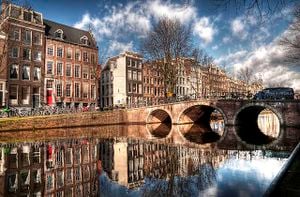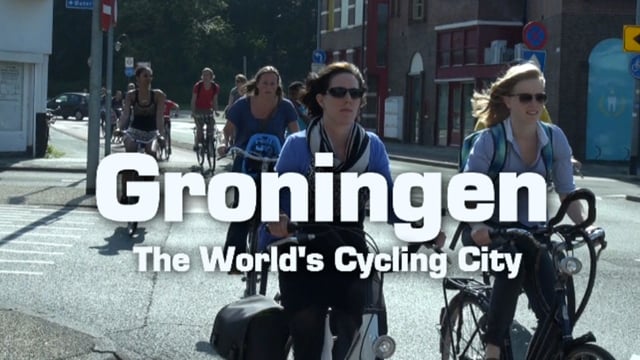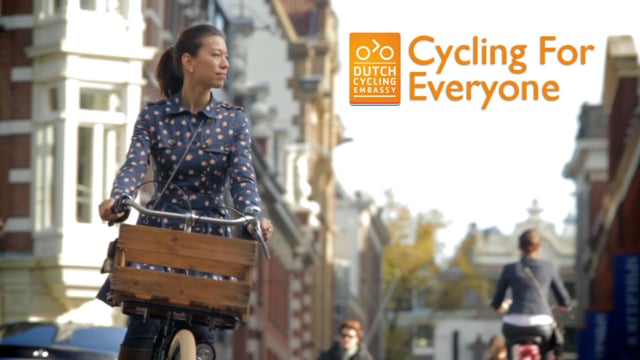
The aim of this page is to recognise, celebrate and encourage the self-empowerment of community agency networks (CANs) and community groups' activism for climate, environment and many other sustainability topics across the Netherlands.
 The Hague becomes world’s first city to pass legislation making it illegal to advertise fossil fuel products and services with a high carbon footprint, theguardian.com (Sep 13, 2024) — this includes petrol and diesel, aviation and cruise ships
The Hague becomes world’s first city to pass legislation making it illegal to advertise fossil fuel products and services with a high carbon footprint, theguardian.com (Sep 13, 2024) — this includes petrol and diesel, aviation and cruise ships The city where ‘the future has already arrived’, positive.news (Mar 18, 2024)
The city where ‘the future has already arrived’, positive.news (Mar 18, 2024)  European nations must end repression of peaceful climate protest, says UN expert, theguardian.com (Feb 28, 2024)
European nations must end repression of peaceful climate protest, says UN expert, theguardian.com (Feb 28, 2024)
Networks and sustainability initiatives[edit | edit source]
- Transition Towns Nederland, Transition support materials (in Dutch)
- Areaonline, Gebiedonline cooperative, "a flexible online community platform under our own management" and a cooperative of local and passion-driven communities. Non-profit cooperative with membership fees charged to pay for maintenance and further development of the platform. added 13:04, 8 February 2022 (UTC)
Community energy[edit | edit source]
Hoofdpagina - WindParken, Wiki used in the Netherlands to plan windturbines, to realise a CO2 cut of 20 to 30%. (in Dutch)
Cycling activism[edit | edit source]
Groningen is known as the "World Cycling City"; around 57% of its residents use a bicycle for regular commute within the city. In 2000, Groningen was chosen as the Fietsstad 2002, the top cycle-city in the Netherlands for 2002. Similar to most Dutch cities, Groningen has developed to accommodate a large number of cyclists. An extensive network of bike paths were planned to make it more convenient to cycle to various destinations instead of taking a car.
The city has segregated cycle-paths, public transport, and a large pedestrianised zone in the city centre. Groningen's city centre was remodeled into a "pedestrian priority zone" to promote walking and biking. This was achieved by applying the principle of filtered permeability—the network configuration favours active transportation and selectively "filters out" traveling in a car by reducing the number of streets that run through the centre. The streets that are discontinuous for cars connect to a network of pedestrian and bike paths which permeate the entire centre. In addition, these paths go through public squares and open spaces, increasing aesthetic appeal and encouraging participation. The logic of filtering a mode of transport is fully expressed in a comprehensive model for laying out neighbourhoods and districts—the fused grid.
Rewilding[edit | edit source]
In the 1980s, analogue species (Konik ponies, Heck cattle and red deer) were introduced to the Oostvaardersplassen nature reserve, an area covering over 56 square kilometres (22 sq mi), in order to (re)create a grassland ecology by keeping the landscape open by naturalistic grazing. This approach followed Vera's 'wood-pasture hypothesis' that grazing animals played a significant role in shaping European landscapes before the Neolithic period. Though not explicitly referred to as rewilding, many of the project's intentions were in line with those of rewilding. The case of the Oostvaardersplassen is considered controversial due to the lack of predators, and its management can be seen as having to contend with conflicting ideas regarding nature.
Food activism[edit | edit source]
- GROW the City (in Dutch)
- Honey Bank project in Holland (in Dutch)
Reduce, reuse, repair and recycle[edit | edit source]
Road safety[edit | edit source]
A woonerf (Dutch pronunciation: [ˈʋoːnɛr(ə)f]) is a living street, as originally implemented in the Netherlands and in Flanders (Belgium). Techniques include shared space, traffic calming, and low speed limits.
The term woonerf has been adopted directly by some English-language publications. In the United Kingdom, these areas are called home zones.
Sharing[edit | edit source]
shareNL, Dutch knowledge and network platform for the collaborative economy - De Deelkelder, Utrect
Towards sustainable economies[edit | edit source]
Basic income
In the Netherlands, municipal-level basic income experiments have faced setbacks and changes in the quest to meet compliance with federal law; however, as of October (2017), several cities have now launched experiments with the removal of conditions on social assistance benefits..@BasicincomeOrg
Research[edit | edit source]
- International Centre for Integrated assessment and Sustainable development (ICIS)
- Working Group on Development Techniques
Other resources[edit | edit source]
About the Netherlands[edit | edit source]
Past events
- November 29, 2014 Buy Nothing Day (in Dutch)
The Netherlands, informally Holland, is a country in Northwestern Europe, with overseas territories in the Caribbean. It is the largest of the four constituent countries of the Kingdom of the Netherlands. The Netherlands consists of twelve provinces; it borders Germany to the east and Belgium to the south, with a North Sea coastline to the north and west. It shares maritime borders with the United Kingdom, Germany, and Belgium. The official language is Dutch, with West Frisian as a secondary official language in the province of Friesland. Dutch, English, and Papiamento are official in the Caribbean territories.
Netherlands literally means "lower countries" in reference to its low elevation and flat topography, with 26% below sea level. Most of the areas below sea level, known as polders, are the result of land reclamation that began in the 14th century. In the Republican period, which began in 1588, the Netherlands entered a unique era of political, economic, and cultural greatness, ranked among the most powerful and influential in Europe and the world; this period is known as the Dutch Golden Age. During this time, its trading companies, the Dutch East India Company and the Dutch West India Company, established colonies and trading posts all over the world.
With a population of over 18 million people, all living within a total area of 41,850 km2 (16,160 sq mi)—of which the land area is 33,500 km2 (12,900 sq mi)—the Netherlands is the 33rd most densely populated country, with a density of 535 people per square kilometre (1,390 people/sq mi). Nevertheless, it is the world's second-largest exporter of food and agricultural products by value, owing to its fertile soil, mild climate, intensive agriculture, and inventiveness. The four largest cities in the Netherlands are Amsterdam, Rotterdam, The Hague and Utrecht. Amsterdam is the country's most populous city and the nominal capital, though the primary national political institutions are located in the Hague.
Near you[edit | edit source]
External links
- Hivos international, Dutch organization for development. Hivos provides financial support to organizations in Africa, Latin America and Asia, it provides advocacy and it supports knowledge sharing in particular in the field of social change, digital activism and rural innovations. W











